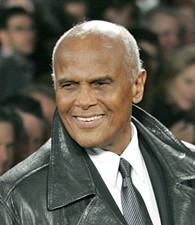Harry Belafonte’s handsome looks and velvety voice, coupled with his talent as an actor and producer, have earned him fame and accolades. But he has achieved nearly equal distinction for his humanitarian record and his fight to end poverty in Africa, and notoriety for his controversial stance on hot-button issues such as foreign policy.
Harry Belafonte’s Early Days
Harold George Belafonte Jr. was born on March 1, 1927, in Harlem, New York. His parents had both emigrated from the Caribbean. Belafonte grew up during the Great Depression and his parents divorced when he was young.
When he was eight years old, he and his mother moved back to Jamaica, but returned to the United States five years later. After cutting short his high school education and serving in the U.S. Navy, Belafonte came back to New York, where he took acting classes alongside Marlon Brando and Tony Curtis. He also performed with the American Negro Theatre and began singing in cabarets. In 1949, Belafonte recorded his first record of pop songs, but soon realized his passion for folk and West Indian music.
Sources in this Story
- Biography.com: Harry Belafonte
- VH1: Harry Belafonte
- IMDb: Biography for Harry Belafonte
- YouTube: Harry Belafonte on “The Muppet Show”
- Time: Lead Man Holler
- Democracy Now: “We Have Got To Bring Corporate America To Its Knees—Harry Belafonte on Racism, Poverty, John Kerry, War and Resistance
Notable Accomplishments
Belafonte became a film star when he played the male lead in “Carmen Jones” (1954), Oscar Hammerstein’s modern-day adaptation of Bizet’s opera “Carmen.” (Despite Belafonte’s considerable musical talent, someone else dubbed all of his songs in the film.) He has also had a thriving television career; he was the first African-American person to win an Emmy, with his 1959 special “Tonight with Belafonte.” Belafonte was the first African-American to win a Tony award and produce a film. His album “Calypso” was the first album to sell a million copies.
Listen to Belafonte sing one of his best-known songs, “Day-O (Banana Boat Song),” on a 1978 episode of “The Muppet Show” and explain the definition of a “tallyman” to Fozzie Bear. The song gained renewed popularity in 1988, when it was used during a climactic scene in the movie “Beetlejuice,” which also featured several other Belafonte songs.
The Rest of the Story
A 1959 Time magazine profile demonstrates Belafonte’s early commitment to activism. As he rode the New York City subway, he noticed the exclusionary language in advertisements, such as one that advised commuters to use lotion to “preserve the soft white beauty of their hands.” He’d add in pencil: “How about Negro hands?”
The Man and His Work
- “Carmen Jones” (DVD)
- “Odds Against Tomorrow” (DVD)
- “An Evening with Harry Belafonte and Friends” (DVD)
- “Calypso” (CD)
- “The Very Best of Harry Belafonte” (CD)
Belafonte was friends with Martin Luther King Jr. and paid his bail after King’s arrest in Birmingham, Alabama. He later secured the release of other jailed civil rights activists. Alongside Charlton Heston and Sidney Poitier, he promoted the March on Washington in 1963, where King gave his legendary “I Have a Dream” speech. In the 1980s, Belafonte helped produce the “We are the World” CD and sent millions of dollars in profits to help end a famine in Ethiopia. When Nelson Mandela visited the United States, Belafonte served as his host.
Belafonte was a critic of the Bush administration and a vocal supporter for the controversial Venezuelan president, Hugo Chavez. In 2002, his public derision of Colin Powell, whom he called a “house slave” and his purposeful exclusion of Condoleezza Rice at an Africare event, angered many people.
This article was originally written by Shannon Firth; it was updated January 11, 2017.











